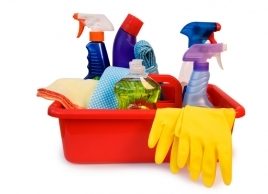Clean up or clear out
Is it time to give toxic relationships a spring cleaning?

Source: Adapted from Health Smart; April 2008
There’s something deeply purifying about spring-cleaning one’s cupboards, but it usually takes me a couple of weeks to psych myself up for these perennial purges. Then, suddenly, the right mood will strike and, armed with a roll of giant black garbage bags and my favourite George Michael tracks for accompaniment, I’ll finally tackle the clutter.
Life, as it happens, is littered with situations that need ongoing attention and maintenance. Lawns periodically need mowing, hair necessitates grooming, social invitations demand reciprocity, cars require servicing, and so on—but who, in all honesty, consciously decides it’s time to spring-clean the relationships in their life?
It may seem like a strange notion, but there are definitely times when one should. Why? Because anyone who consistently drags us down, makes our blood boil, wears us out, deflates us, or belittles or confuses us is potentially as toxic to our health as a party filled with smokers or a drunk driver heading in our direction.
It usually takes just one small thing to bring into focus what may have been blurred for a long time: suddenly, you notice the true colours of a friend you always considered steadfast and loyal. Once she amused you with her soapbox dramas, but lately you’ve become conscious that it’s only tittle-tattle that fuels your relationship—and now you’ve fallen victim yourself to her scuttlebutt. It’s time to reassess.
Dr. Lillian Glass says there are all kinds of toxic people in the world who can cause us chronic pain and aggravation. In her book, Toxic People, she identifies 10 distinct toxic types, including the boss who’s never satisfied; the friend who always knows where we’re going wrong (and who revels in telling us); and the critical parent who can’t stop treating us like a disobedient child.
A friend of mine once described how a colleague of hers would rant when things went wrong at their work. “I’d try to calm her down and would eventually succeed, but I’d be left feeling utterly depleted. It took me a while before it dawned on me that she was transferring all her negativity onto me.”
My friend pointed out that her colleague could also be gracious and helpful; nevertheless, my friend had to learn new coping skills to deal with her colleague’s tantrums. “Our relationship dramatically improved once I learnt to put up boundaries and consciously chose not to become engaged,” she admits.
Experts agree that there are all kinds of toxic people—and some are more toxic than others. There are the ones who complain all the time. There are the ones who blame everyone (except themselves) for everything. And there are those who feed like leeches on your positivity.
Life coach Cheryl Richardson refers to them variously as Blamers, Drainers and Shamers. Glass has identified Competitors, Meddlers and Cut-You-Downers, to name but three toxic terrors. Whatever the labels, both Glass and Richardson believe we owe it ourselves to weed these people from our lives as efficiently as we prune our garden borders, cull our wardrobes or detoxify our diets. The company we keep continually informs who we are, after all. Culling unhelpful relationships, as a result, can be as self-renewing as the conscious commitment we make to be kinder to strangers or to inject a little more fun into our lives.
Over the years, I’ve identified relationships that weren’t doing me any good. Sometimes the toxicity of the relationship wasn’t the other person’s fault entirely—I was as much to blame. A roommate and I, for example, once waged a senselessly competitive battle until we parted ways to our mutual relief. On another occasion, I realized a close male friend and I both tended to indulge in existential blues. Each of us tired of the downbeat tone of our get-togethers—and found positive new ways to forge our friendship.
None of us is alone in suffering destructive interactions from time to time. Sometimes, when it’s our life partners or bosses, it’s exceedingly tricky deciding what course of action to take. However, we can all get better at identifying toxic relationships more swiftly and learn to deal efficiently with destructive behaviour.
If a person constantly leaves us feeling outraged or depressed, the experts are unanimous: you should do something. Either block out the toxic behaviour or find ways to contain your exposure to it with some kind of emotional buffer zone.
Until recently, my brother and I were enmeshed in a toxic dynamic. I was the all-knowing big sister, he the helpless victim: our encounters left both of us feeling increasingly frustrated and dejected. Eventually, we coped by taking time out and later arranged for a close friend to mediate on our behalf. It took time, but it has resulted in a more harmonious relationship.
“How wonderful it is to scrub and clean. Day by day, the heart and mind grow clearer.” So said renowned monk and scholar Thich Nhat Hanh, who knew a thing or two about spring-cleaning one’s emotional house.
Like Nhat Hanh, one may have to wash away old anger and grudges; dust off tired, negative attitudes; and ultimately decide whether one wants to keep, discard or launder a relationship.
Instead of allowing others to make us feel lousy, why not gravitate towards people who love to laugh out loud and who make us feel good about ourselves? In the end, it’s just plain smart to watch the company we keep.
Found this article informative? Subscribe to our magazine today and receive more Best Health exclusives delivered to your door!




